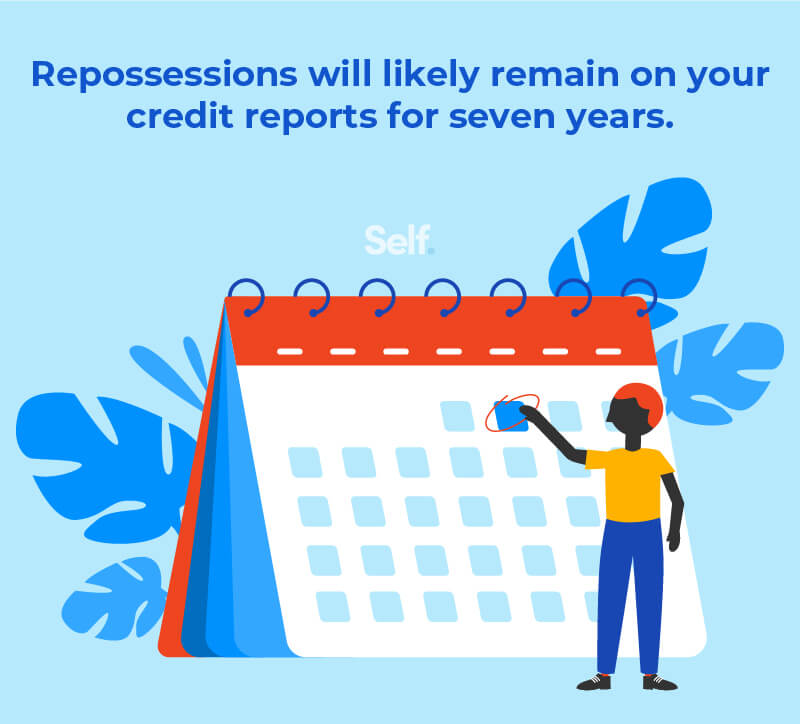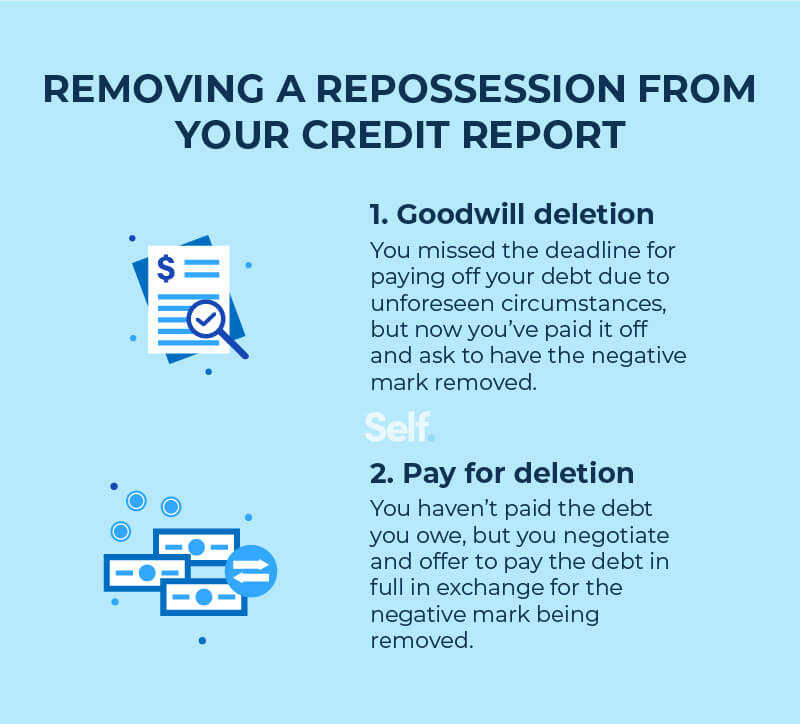How Long Does a Repossession Stay on Your Credit Report?
Published on: 09/06/2021
Your credit report includes more than just records of your payment history; it also includes things like repossessions and foreclosures. “Repossession” refers to property that is seized (rightfully and lawfully) to repay the debt owed.
Repossessions can occur as a result of failure to pay back a loan. When you take out a loan to buy something, the thing you’re buying acts as collateral to ensure you make your loan payments.
Say, for example, you’ve taken out a car loan. Depending on where you live, the lender’s name may still be on the title as long as you’re making monthly payments and there’s a loan balance you haven’t paid off.[1]
But regardless of who’s on the title, as long as you still owe money on your auto loan, the bank has the right to take your vehicle if you stop making car payments.
Records of major events like a car repossession can be extremely damaging to your credit, and not just in the short term. In fact, accurate negative marks will remain on your credit reports for up to seven years, including repossessions.
You should be aware that there are two kinds of repossessions: voluntary (also known as surrenders) and involuntary. A voluntary surrender can look a little better on your credit report because it shows you’re trying to work with the lender to come up with what you owe. On the other hand, an involuntary surrender makes it seem like you’ve broken your loan agreement outright.

How long does a repossession stay on your credit report?
A repossession will stay on your credit report for seven years from the date you stopped paying the loan balance.
Once a lender has reported the repossession to the credit bureaus, it can take anywhere from 30 to 60 days to show up on your credit reports.
Can a repossession be removed from your credit report?
You may be wondering, “Can I remove a repossession from my credit report?” Unfortunately, the answer is no, not if it’s accurate. Accurate information reported on your credit report cannot be removed.[2] Errors, however, can and should be addressed, and you can get them removed by disputing them.
To see if there are any errors in your report, check with the three main credit bureaus (Equifax, Experian and TransUnion) about verifying your debt. In addition, under federal law, you’re entitled to a free credit report once a year at annualcreditreport.com.
Once you’ve got your report, look through it for anything that doesn’t seem right. Unfortunately, reporting errors happen. In fact, one federal study revealed that 5% of credit reports contained errors.[3] These errors can range from incorrect payment dates to duplicate entries, from transposed numbers to identity theft.
If you find that something on your credit report is old (such as a debt you’ve already discharged) or a mistake, you can dispute it. If you're successful, the negative information will be removed.

If the negative mark is accurate, you can ask for one of two things:
- Goodwill deletion: Sometimes, the negative mark is due to things beyond your control (you lost your job or were hospitalized). In that case, you can write a letter to your creditor asking for the negative item to be removed from your credit report. You're more likely to be successful if you've since paid your debt and are making on-time payments. Remember that since the negative item was accurate, creditors do not have to honor goodwill requests.
- Pay for deletion: Your creditor may be open to removing the negative mark from your credit report. You'll likely either have to pay the debt off in full or pay an agreed-upon reduced amount. Ask your creditor for an agreement in writing.
How does a repossession affect your credit score?
A variety of factors go into your credit score. First, two major credit-scoring entities are VantageScore and the more widely used FICO® (short for Fair Isaac Corporation), which produces the FICO score.
FICO scores range from 300 to 850 and are divided into five categories: exceptional (800-850), very good (740-799), good (670-739), fair (580-699), and very poor (300-579). To calculate your score, FICO considers five different weighted factors, the most important of which is your payment history, which constitutes 35% of your score.
As a result, late payments tend to hurt your credit score more than anything else. And since a repossession only occurs after multiple missed payments, it can be particularly damaging to your credit score.
On top of having a repossession marked on your credit report, the following would likely contribute to negative marks:
Late payments
- Every missed payment (29 days late) results in a negative mark on your credit report, which reflects poorly on your score.[4]
- The impact on your credit score will depend on your overall credit profile and how late you are.[5]
- If you already had poor credit, then the impact may not be so bad.
- If you previously had good credit, and this was one of your only late payments, then there will likely be a greater score drop.
Delinquencies
- An account will remain delinquent until a borrower pays the overdue amount plus any fees or charges resulting from the delinquency.[6] If a borrower misses multiple payments, after three to six months of nonpayment, the loan will go into default.[7] Delinquencies are not as serious as defaulting.
Defaults
- A default occurs when the borrower is delinquent on an account and doesn’t make payments on the loan after three to six months of being late. This borrower will then default on their loan for failure to pay back the loan.
- Because defaults are more seriously past due, they will more negatively impact your credit history.
Collections
- Collection accounts are reported by lenders who transfer your account to a collection agency if you have been delinquent for several months. The lender writes the debt off its books (called a charge-off). Still, it doesn’t disappear: You now owe the collection agency instead of the original creditor.
- This negatively impacts credit scores if the debt is large.
- Smaller debts (less than $100) should not seriously affect your credit score.[8]
Recent credit reporting information is weighed more than older credit history. So whether you're paying student loans, personal loans, or auto loans, paying on time is the way to go.
The good news is that the longer in the past the repossession happened, the less it should weigh down your credit score. Assuming you continue to use credit responsibly, the positive information will outweigh the negative.
How can you rebuild your credit after a repossession?
Even after a repo, you can still rebuild or repair your credit. There’s a difference between these two processes that’s worth noting. Credit repair is the process used to remove inaccurate information from your credit report. On the other hand, rebuilding your credit involves doing what's necessary to improve your credit score. You can build credit by:
- Checking your credit. Do so regularly to ensure you’re up to date on payments and to guard against errors. You can also track your progress by getting a free credit score from FICO.[9]
- Making on-time payments. Because on-time payments account for the highest percentage (35%) of your FICO score, this is the most proactive step you can take to get results.
- Paying down debt. Paying down your debt helps lower your credit utilization ratio (the amount of debt you’re carrying compared to your credit limit). Because the amount of debt you have accounts for 30% of your credit score, paying off debt can help you build your credit.
It's also a good idea to avoid the temptation to apply for new credit. Every time you apply for new credit, a hard inquiry is added to your credit report. A hard inquiry is when a lender looks at your credit report to determine whether to grant you a loan. Each hard inquiry can shave a few points off your credit score. Since a repo is likely to leave you with a bad credit score, an application for new credit is expected to be unsuccessful anyway.
The bottom line
Auto lenders don’t want to repossess your car; they’d rather get paid, so they only repossess as a last resort. This makes repossessions look even worse for your credit.
A repossession can hurt your credit history. It shows that you've gone so long without paying your bills that the lender decided to give up trying to collect the money you owe. Instead, the lender took back the collateral you're holding (such as a vehicle).
After repossession, you'll probably have a hard time getting a loan or credit card. However, if you're successful, you may face higher interest rates.
You wouldn't be able to get a repossession removed from your credit history unless it was mistakenly added to your credit report. You'll have to wait seven years for it to disappear from your reports, although it will have less of an impact on your credit score as time passes.
In the meantime, the best thing you can do is look to the future. Get your personal finances back in order by building your credit through on-time payments, low credit card balances, selective applications, and diligence at tracking your credit. It won’t happen overnight, but you can build your credit again, so it will be there when you need it.
Sources
- Car and Driver. “Who Has the Vehicle’s Title During Financing?” https://www.caranddriver.com/research/a32780457/when-financing-a-car-who-has-the-title/. Accessed July 13, 2021.
- Experian. “Can I Remove Negative but Accurate Information from My Credit Report?” https://www.experian.com/blogs/ask-experian/can-remove-negative-accurate-information-credit-report/. Accessed July 13, 2021.
- Federal Trade Commission. “In FTC Study, Five Percent of Consumers Had Errors on Their Credit Reports,” https://www.ftc.gov/news-events/press-releases/2013/02/ftc-study-five-percent-consumers-had-errors-their-credit-reports. Accessed July 12, 2021.
- Experian. “How Does a Repossession Affect Your Credit?” https://www.experian.com/blogs/ask-experian/how-does-a-repossession-affect-your-credit/. Accessed July 13, 2021.
- Experian. “When Do Late Payments Get Reported?” https://www.experian.com/blogs/ask-experian/when-do-late-payments-get-reported/. Accessed July 13, 2021.
- Investopedia. “Delinquency vs. Default: What’s the Difference?” https://www.investopedia.com/ask/answers/062315/what-are-differences-between-delinquency-and-default.asp. Accessed July 13, 2021.
- Experian. “Will a Default Be Removed if It’s Paid?” https://www.experian.com/blogs/ask-experian/will-a-default-be-removed-if-paid/. Accessed July 13, 2021.
- Equifax. “Collection Accounts and Your Credit Scores,” https://www.equifax.com/personal/education/credit/score/collection-accounts/. Accessed July 13, 2021.
- Experian. “Free Credit Score,” https://www.experian.com/consumer-products/credit-score.html. Accessed July 13, 2021.
Editorial Policy
Our goal at Self is to provide readers with current and unbiased information on credit, financial health, and related topics. This content is based on research and other related articles from trusted sources. All content at Self is written by experienced contributors in the finance industry and reviewed by an accredited person(s).
